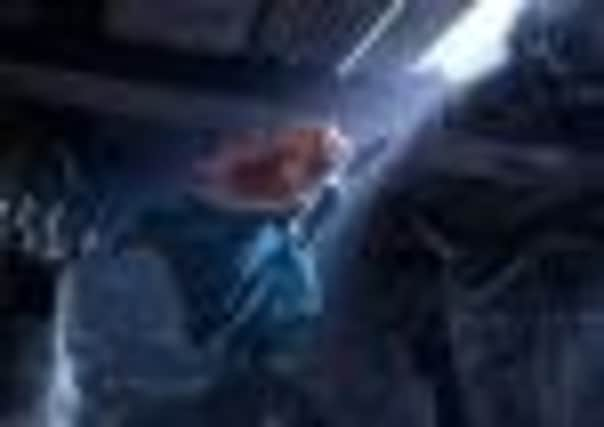Film review: Brave


BRAVE (PG)
DIRECTED BY: MARK ANDREWS, BRENDA CHAPMAN, STEVE PURCELL
VOICES: KELLY MACDONALD, BILLY CONNOLLY, KEVIN MCKIDD
RATING: ****
It’s easy to be sceptical about Brave, Disney/Pixar’s Scottish-set fairytale. Already the subject of a heavily promoted tourist initiative and likely to be further hijacked by various political concerns too blinkered to realise that its heroine’s quest for freedom has been cannily offset with a storyline about the value of unity and harmony, its arrival in Scottish cinemas will hopefully return the focus to what’s important: its status as a film.
In this respect Brave is a more surprising effort than expected. The story of Merida, a flame-haired princess (winningly voiced by Kelly Macdonald), whose desire to forge her own path in life rather than marry one of the hapless future clan chiefs her royal parents are allowing to compete for her hand, is neither a straightforward subversion of the old Disney way of doing fairytales, nor another predictably perfect Pixar outing. Indeed, for the first 30 minutes or so it’s the incidental details – the lush design work that captures the mystery of the setting; the charming deference to Highland customs, dialects and Scots vocabulary – that are the real indications that we’re in Pixar territory. Storywise, things feel slightly mundane as the film (which has three credited directors and four screenwriters) attempts to establish Merida’s plight by letting us see the way in which she’s been subjected to a strict upbringing while her mischievous triplet brothers are allowed to run amok. It’s not that these early scenes don’t have their moments – Billy Connolly’s boisterous vocal work as Merida’s father, the adorably oafish King Fergus, is a joy, as are Kevin McKidd’s impenetrable Doric mumblings as one of Merida’s suitors – yet narratively speaking, things feel a little uninspired.
Advertisement
Hide AdMercifully this feeling doesn’t last. As the push-pull of that aforementioned parent/child dynamic – specifically the mother/daughter conflict – comes into play, the film starts to have a more daring edge. A focus on relatable familial travails is nothing new in animation, but Brave’s status as Pixar’s first foray into the magical realm of fairytales allows it to gradually subvert these themes in the sophisticated way we’ve come to expect from the studio that transformed the Toy Story films into parables of parental anxiety and The Incredibles into a complex meditation on the value of meritocracy. In Brave this narrative envelope-pushing manifests itself in the way it plays with the classic fairytale idea of a princess desperately trying to escape a wicked stepmother by having Merida lock horns with her actual mother instead.
This is Queen Elinor (Emma Thompson), the Kingdom’s level-headed matriarch whose oppressive, seemingly spirit-crushing attitude towards the rebellious and independently minded Merida is not born out of jealousy or vanity but a loving, if over-zealous, desire to protect her daughter and secure her future. This initially makes her the film’s least fun character as her nagging, traditionalist views fuel Merida’s desire to strike out on her own and get her mother off her back. But as Merida takes drastic measures to do just that – with a dash of magic that threatens to spell permanent disaster for Elinor, her family and the kingdom as a whole – she’s transformed into a wonderfully engaging and beautifully realised fairytale character.
It’s at this point that Brave starts living up to its title by transforming what at first seems like a rather rote girl-power fantasy into something with a little more depth. Though Merida’s nature-loving, bow-and-arrow-slinging, marriage-rejecting attitude makes her an easy-to-admire heroine in a medium not exactly overburdened with strong female characters, her unsentimental reaction to her own curse-inducing teenage angst marks her out as a more complicated character. Her revisionist feminist credentials are not, for instance, defined simply by her rejection of the need for a prince, but by the ways in which her increasing awareness of the complex machinations of the world enable her to adapt to it in ways that allow her to negotiate her own fulfilling path.
All of which might make Brave sound much heavier than it is, but it’s a testament to the film that while it certainly satisfies as a buoyant family-friendly adventure story with typically gorgeous visuals and fun, feisty characters, it’s not the kind of neatly packaged fairytale with an easy-to-glean moral that Hollywood traditionally serves up. Whether that’s by accident or design is open to interpretation. The much-reported creative differences that resulted in Mark Andrews replacing original director Brenda Chapman 18 months before production wrapped may well have contributed to the film’s slightly Frankensteined plot, but such imperfections add to the film as a whole. Brave is beautiful and messy and more complicated – and consequently harder to categorise – than it at first appears. A perfect testament, perhaps, to the setting that inspired it.